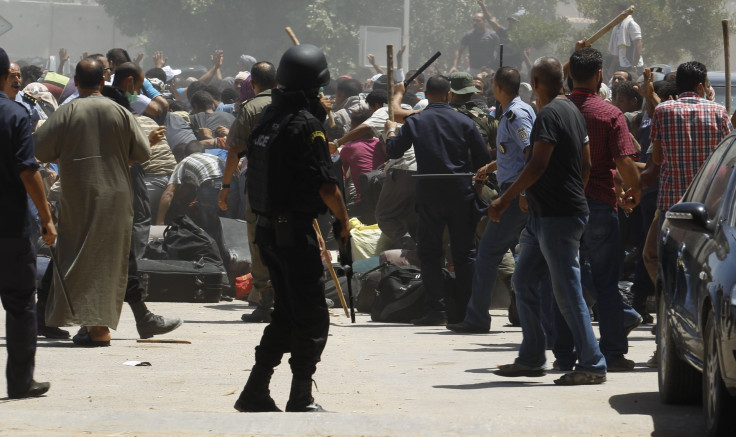British Embassy In Libya Shuts Briefly To Work From Tunisia While Philippines Urges Citizens To Leave

Tunisia closed its main border crossing with Libya Friday after thousands of stranded Egyptian and other foreign nationals attempted to use it as their escape route amid the escalating violence in Libya, BBC News reported. Meanwhile, the British Embassy in Tripoli be suspending its operations after Monday, the U.K.’s Foreign and Commonwealth Office, or FCO, said.
Several countries have pushed their citizens to leave Libya as the violence in the country worsened during the past two weeks, with clashes and rocket attacks in the capital city of Tripoli. The U.K.’s FCO had previously urged its citizens to leave the country and said consular assistance would be unavailable there following Monday. More than 200 people have been killed in Tripoli and Benghazi, which saw Islamist insurgents take over a Libyan special-forces base.
“The protection of our staff is paramount, and we assess that the current environment in Tripoli does not allow us to operate safely. We have therefore decided temporarily to relocate U.K.-based staff from the country,” the British Mirror quoted an FCO representative as saying.
U.K. Ambassador to Libya Michael Aron said British consular personnel would try to work from neighboring Tunisia, but added that fighting in the region had led to concerns about staffers getting stuck in crossfire. He tweeted Friday:
Reluctantly we've decided we have to leave & temporarily suspend Embassy operations in #Libya. We will be back as soon as security allows.
— Michael Aron (@HMAMichaelAron) August 1, 2014The British government said in an advisory Friday: “Due to the more intense and more widespread fighting in Tripoli, and greater instability throughout Libya, the [FCO] advise against all travel to Libya. British nationals in Libya are strongly urged to leave immediately by commercial means.”
Meanwhile, the Philippines also urged its citizens in the region to leave Libya when they can, and it is sending a ship to help them evacuate from Benghazi, Misrata and possibly Tripoli. Its government also expressed its annoyance at 13,000 Filipino workers who have refused to leave Libya because they fear they might not get jobs back home.
“The [Department of Foreign Affairs] is appealing with urgency to those who have not made the decision to be repatriated to please consider doing so as the avenues of repatriation are quickly diminishing,” the Philippines government said in a statement Saturday, according to Agence France-Presse.
© Copyright IBTimes 2025. All rights reserved.






















